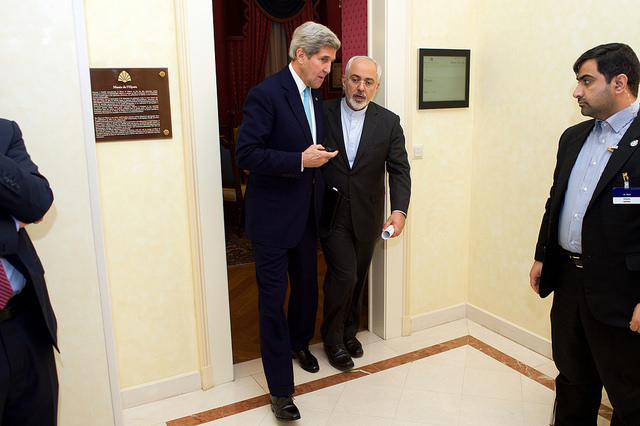by Shireen T. Hunter
According to reports in the U.S. media, former Secretary of State John Kerry in meetings with Javad Zarif , Iran’s minister of foreign affairs, expressed the view that it would be better for Tehran to wait out the remaining years of the Trump administration before engaging in new talks with a Democratic successor. Actually what Secretary Kerry in his interview with Fox News host Dana Perino said was: “ Well, everybody is waiting around talking about waiting out President Trump.”
Whether this statement amounts to Kerry advising Zarif not to engage with the Trump administration is debatable. However, it is not in Iran’s interest to wait out Trump. Doing so would exacerbate Iran’s many economic and political problems, prompt Washington to impose even more restrictions on Iran, and even increase the risk of potential American military attack.
Such a strategy of waiting out Trump assumes that the policies of previous U.S. administrations toward Iran were significantly different from those of the Trump administration. It also assumes that a future Democratic administration, or possibly even a more moderate Republican president, would adopt a different approach toward Tehran. Yet the Iran policies of past administrations from 1988 onwards strongly indicate that such a change is unlikely to happen. A major reason for this skepticism is the changed international setting since the Soviet Union’s collapse.
The End of the Cold War and US-Iran Relations
Throughout most of the 1980s, the U.S. approach to Tehran was greatly influenced by the Soviet factor and the ongoing Cold War. This is one reason why the United States did not pressure the Islamic Republic beyond a certain point and did not take direct military action against it, even during the hostage crisis of 1979-1981. Washington feared that excessive pressure and, even more so, military attack could provide Moscow with a pretext to move into Iran or otherwise dominate it.
Since the USSR was already in Afghanistan, this was a real possibility. Moscow’s domination of Iran would also have seriously undermined the U.S. position in the Persian Gulf. This latter concern was behind the enunciation of the Carter Doctrine.
By 1987, the situation, and hence American calculations regarding Iran, began to change. This was the year that Mikhail Gorbachev started his reforms and announced the so-called New Thinking in Soviet foreign policy. According to this new approach, the USSR’s foreign policy was to be determined by national interest calculations and not ideological competition with the West. And, according to the New Thinking, Moscow’s foreign policy was to help its economic revitalization. This change in Soviet thinking was, in fact, the beginning of the end of the Cold War.
Impact on U.S. Policy
This change in the USSR’s foreign policy outlook also meant that Moscow would no longer challenge the United States in the Middle East and in the Persian Gulf, including Iran. Thus, in April 1988, the United States attacked Iranian ships and oil platforms. These attacks eliminated any remaining Iranian hopes of defeating Iraq and led it to to agree to a ceasefire in its war with Iraq. After the end of the Iran-Iraq war, despite Tehran’s overtures, America chose Saddam Hussein’s Iraq as its new partner in the Persian Gulf only to be rudely disappointed when Baghdad attacked Kuwait in 1991. At that time, America made an overture to Tehran to join the anti-Saddam coalition. Iran’s domestic politics did not allow such a bold gesture, but Iran remained largely neutral, which helped the anti-Saddam coalition’s victory.
Soon after the Soviet Union’s collapse in December 1991, Secretary of State James Baker announced during a trip to Central Asia that the George H. W. Bush administration would block Iran’s presence in the post-Soviet space. Then came the Clinton administration’s dual containment policy, the 1996 economic sanctions, and the continued effort to keep Iran out of the developing regional energy and transport networks. The ultimate goal of the dual containment strategy was also regime change: through sanctions and other pressures, not the use of force.
Under the influence of 9/11, dual containment changed into a policy of active regime change in several Middle Eastern states, of which Iran was one. The George W. Bush administration, for instance, included Iran as one of three countries in its “axis of evil.” But even the Obama administration, especially while Hillary Clinton was secretary of state, pursued a policy of pressure rather than incentives. Clinton’s language regarding Iran was not much milder than that of Donald Trump. At one point, she said that, if Iran attacked Israel, America would obliterate it. She was also the first to talk about imposing crippling sanctions on Tehran. In fact, the worst of the sanctions came under the Obama presidency. Clinton also claimed that her insistence on severe sanctions brought Iran to the negotiating table. The Obama administration, too, mulled over the idea of a military strike on Iran. Had Clinton won the presidency in 2016, she, too, would likely have pursued a harsh policy toward Tehran.
The slow implementation of those aspects of the Joint Comprehensive Plan of Action (JCPOA) related to sanctions relief under President Obama triggered Iran’s complaints. During the remaining months of the Obama presidency, there were no breakthroughs in banking operations and no major U.S. investments in Iran. Immediately after the Obama administration signed the JCPOA, it raised the issue of missiles. In short, Donald Trump has merely escalated the dispute further. The essence of his policy, namely bringing Iran to its knees through pressure, is the same as those of the last four American administrations.
Continuity of Policy
U.S. policy toward Iran has been remarkably consistent because the main irritants in U.S.-Iran relations have remained the same since the establishment of the Islamic Republic. Despite episodes of tactical cooperation in Afghanistan and even for a while in Iraq and offers to resolve differences, Iran’s anti-American rhetoric and sometimes actions have continued. Also, Iran’s position on Israel and the Palestinian issue hasn’t changed. As long as Iran doesn’t resolve its dispute with Israel, there’s little hope of normalizing relations with Washington under any president. It is no secret that Israel and its supporters have greatly contributed to America’s harsh policy toward Iran.
In light of this history, waiting for Trump to go in the hope of getting a better deal from America will only lengthen the suffering of Iran and its people. In 1980, Iran delayed reaching an agreement on the hostage crisis in the hopes of getting a better deal from Jimmy Carter’s opponent. This tactic, however, undermined Iran’s then relatively moderate president, Abol Hassan Bani Sadr, enhanced the position of hardliners, and plunged the country into a devastating eight-year war with Iraq.
The Trump administration has adopted a predictably hostile stance toward Iran. But Iran will probably not get an appreciably better deal from whoever comes next.






Over complication.
It is not the US policy towards Ayatollahs. It is Ayatollahs policy towards the US, no matter who is President or which administration is in power in US, that matters to this relationship.
The Ayatollahs have only one policy for USA, and that is to destroy USA. Nothing will change that. They are all sworn to that. It is their path to their salvation.
Of course the Iranian nation loves USA. It always has.
USA needs to make it clear, where it stands with Iranians, and how different that is to where is stands with the horrible Ayatollahs.
The trouble is that different US administrations, have had different policies over the 40 years. All these policies where based on the US audience, not Iranians.
Obama did what a Republican would never do.
Trump did what a Democrat would never do.
None of them actually cared for Iranians dying ever day.
A long history but missing the fact that finally they accepted JCPOA in a bid to lengthen US leading role in world affairs which is already undermined by the next illusionist administration. For sure the US would not be in a position to have a lead again in Iran issue, whatever party it comes from.
You’re right Ms Shireen Hunter this time! Iranians relationship with the US went south in 1953 and progressively this fragile relationship has gotten even worse! During Shah’s ruthless reign, most of the highly educated people in Iran (there were a lot of them too) turn to communism and the stupid Shah, his stupid family and stupid fans kept their heads in the sand until the entire regime and their fans found themselves in a position of either escaping the country or being lynched! In 1975-1976 time frame the CIA had noticed that if they don’t do anything, the US and Israel will loose Iran to the Soviet Union! Eventually they found a disgruntled man in exile, Khomeini, to lead the uprising against the Soviet’s wet dream! The miscalculations of the CIA about the uprising finally backfired again just like it did in 1953. For the past 40 years the Iranian people have been put through hell by the US for its own miscalculations and mistakes. May be and jus a may be JCPOA brought a glimmer of hope to the Iranians and now that’s gone too! So I agree with you and the relationship problems between the US and Iran didn’t start with Trump or Pompeo and Bolton and of course it won’t end with them either! The Iranians anticipation is that they are forced to unite with China, Russia and may be Europe cautiously. If I’m hearing some people correctly, they’re trying to force the US to stay on the wrong side of the history again!
I’m surprised that no one here seems to think that the problem in U.S.-Iranian relations has been due to U.S. policy (and the influence over it of Israel (and Saudi Arabia) and our neocons)- just as they assume the problem in U.S.-Russian relations is Russia’s fault – with our Russophobic mania that they have interfered in our elections, and political life.
After all, why has Iran gravitated toward Russia (and China), and why will it be joining the SCO?
Making peace with Israel would mean making peace on Israel’s terms. Knowing what we have observed for so many decades, is that realistic or viable without a change in our own policy and Israel’s willingness to negotiate in good faith.
“This is one reason why the United States did not pressure the Islamic Republic beyond a certain point and did not take direct military action against it, even during the hostage crisis of 1979-1981. Washington feared that excessive pressure and, even more so, military attack could provide Moscow with a pretext to move into Iran or otherwise dominate it.”
As always in la la land Mrs Hunter. I guess a ten year war with a million Iranian kids killed and gassed is not enough to call it “beyond a certain point”, neither is 40 years of economic war that has created the final climate for the hatred that Russia and China are beginning to feel.
No Mrs Hunter, for you to see the “beyond a certain point” it has to be nuclear blast in Tehran like Sheldon Adelson the Likud boss of President Trump and his adviser John Bolton have advocated:
“What I would say is, ‘Listen. You see that desert out there, I want to show you something.’ … You pick up your cellphone and you call somewhere in Nebraska and you say, ‘OK let it go.’ And so there’s an atomic weapon, goes over balsitic missiles, the middle of the desert, that doesn’t hurt a soul. Maybe a couple of rattlesnakes m, and scorpions, or whatever. And then you say, ‘See? The next one is in the middle of Tehran.’ So, we mean business.”